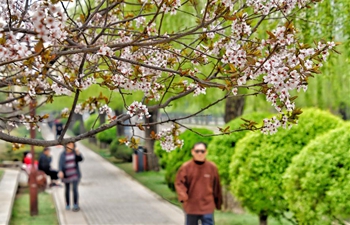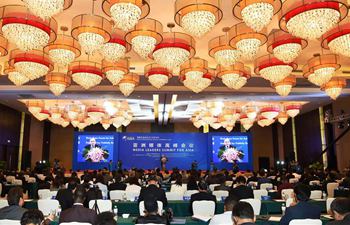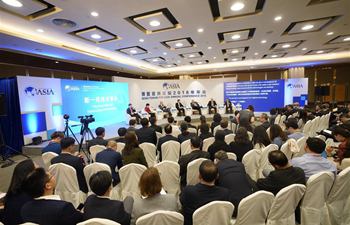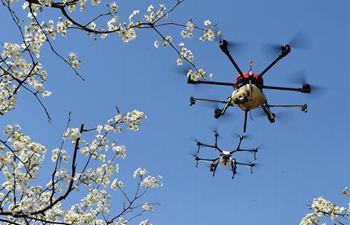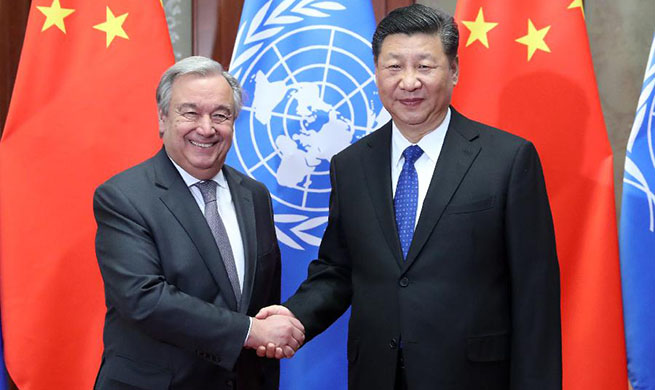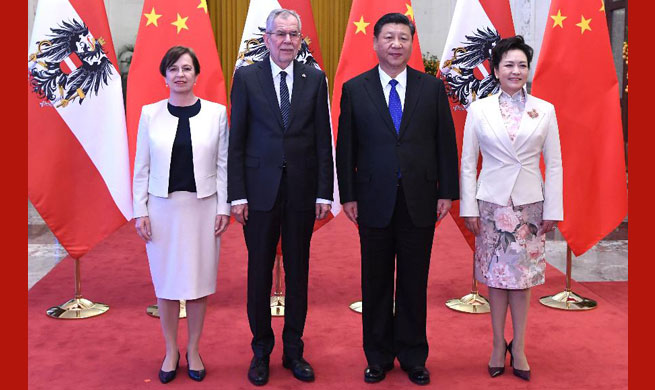By Julia Pierrepont III
LOS ANGELES, April 9 (Xinhua) -- China posted 3.17 billion U.S. dollars in box office returns - its single largest box office cume ever this past quarter - beating out U.S. grosses and catapulting it to the top of the global box office for the first time.
China's chart-topping metrics have Hollywood pundits sitting up and taking notice. They cited China's burgeoning middle-class consumers, young adult audiences and increasing demand for entertainment fare as key drivers for growth.
"Going to the movies is truly a worldwide phenomenon," said Paul Dergarabedian, ComScore's Senior Media Analyst.
"The 'big screen' experience was bolstered by a unique and compelling slate of titles that sparked an exceptional level of enthusiasm by patrons who flocked to movie theaters around the globe, including China." he told Xinhua.
Not only China, while mature movie markets in the United States and other Western territories are flat-lining, other Asian countries are soaring as well.
Demands spurred increased motion picture production and ticket sales, then led to a rapid expansion of theater chains throughout China as businesses seek to capitalize on a booming market.
"The rate that China has been building cinema screens is very high," said David Hancock, director of film and cinema analysis at IHS Technology.
He reported that China has been building cinema screens at a rate of over 10 a day for the last five years, increasing to 27 a day this past year.
"This is an interesting story all the more remarkable for the rapidity of China's ascent to the top spot in the market," Hancock concluded.
China's most recent global box office coup came during China's national Lunar New Year festival in February, when hundreds of millions of holidaymakers pour out of their first or second tier metropolitan areas to return home to their third, forth, etc. ranked cities and towns to spend the holidays with family and friends.
In many of those areas, due to those ambitious theater construction programs and the growing number of mini-movie chains that seat small groups 12 to 15, movie-going is one of the only recreational pursuits on hand.
"China's February box office is always high performing due to the holiday boost," Hollywood studio executive and international film expert, Xian Li, told Xinhua, "especially local Chinese movies, since Hollywood films aren't allowed to be screened at that time."
"Plus word-of-mouth social networking and movie rating sites are huge drivers in China," she added, "They dominate the marketing landscape."
This word-of-mouth boosted ticket sales to an epic 5.4 billion yuan (850 million U.S. dollars) over the holiday itself, according to online ticketing giant, Maoyan, helping to shoot China into the limelight with its globe-topping quarter cume.
But that's not all good news for Hollywood, since, according to Box Office Mojo, almost 2 billion U.S. dollars of that is from homegrown Chinese titles, with less than 1 billion U.S. dollars from U.S. or British releases, down almost 50 percent from 2017 at this time.
Buoyant Chinese sales were led by their local top performers: Bona Film Group's "Operation Red Sea," China's biggest blockbuster after its record-setting 2017 hit, "Wolf Warrior 2."
Meanwhile, Edko Entertainment's family fantasy sequel blockbuster "Monster Hunt," "The Monkey King 3: Kingdom of Women," animated feature "Boonie Bears: The Big Shrink" and the surprise Bollywood megahit Advait Chandan-helmed "Secret Superstar," also have performance in holiday market.
That success sales boosted share prices for China Film Co., distributor of two of the holiday's top films, as well as for Jiangsu Lugang Culture Co., which contributed "Operation Red Sea," and Beijing's Enlight Media Co.
During the same period, not all pre and post holiday Hollywood releases fared as well: Disney's "Black Panther" ranked second in March with a hefty 105 million U.S. dollars and "Pacific Rim: Uprising," Hollywood's sci-fi fantasy produced by Legendary Entertainment, a subsidiary of China's Dalian Wanda, scooped up 90 million U.S. dollars.
But global megahit "Jumaji: Welcome to the Jungle" low-scored with just 77.9 million U.S. dollars, as did Warner Bros' "Tombraider," co-starring Chinese star Daniel Wu.
But they still outstripped Fox's "Maze Runner: The Death Cure," which limped to a 49.7 million U.S. dollars, and Disney's "Star Wars: The Last Jedi" whose force fizzled out, generating only 42.6 million U.S. dollars in sales.
A late release, Steven Spielberg's "Ready Player One" has done 62 million U.S. dollars to date in China.
"Local fare is on the rise," said Xian Li, as she explained how Chinese filmmakers are learning how to deliver the Hollywood-style quality that local audiences have come to expect.
"I've been super impressed by how fast local Chinese filmmakers have improved," she said. "Chinese arthouse directors have always been good, but now their commercial genre fare is also getting better and better, giving audiences the quality they demand."
Wei Meng of China International Capital Corp has expressed a similar sentiment, "Quality and word-of-mouth are becoming the most important drivers of box office."
"Recent box office metrics prove that Chinese movies and filmmakers have earned their place in the sun," said Li.




